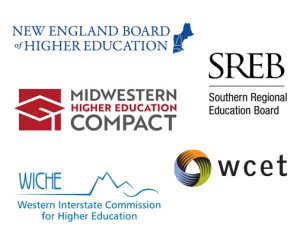Archived Projects & Divisions
Throughout its existence, WCET has worked to take big ideas and make them into actionable projects. Below are some of the projects WCET successfully incubated over the years.
 The National Consortium of Open Educational Resources (NCOER)
The National Consortium of Open Educational Resources (NCOER)
The National Consortium of Open Educational Resources (NCOER) is a partnership of the four higher education regional compacts (NEBHE, MHEC, SREB, and WICHE) focused on increasing access, affordability, and equity of open educational resources (OER). WCET (under Tanya Spilovoy, Russ Poulin, Jenny Parks, and grants from the William and Flora Hewlett Foundation) conceived and founded NCOER. It is now coordinated by SREB.
 The Predictive Analytics Reporting (PAR) Framework
The Predictive Analytics Reporting (PAR) Framework
The Predictive Analytics Reporting (PAR) Framework was a project funded by the Bill & Melinda Gates Foundation and managed by WCET, with the goal to provide analytics as a service, delivering actionable institutional-specific insights on students for 2-year, 4-year, public, and proprietary institutions. The PAR Framework applied descriptive, inferential, and predictive analytical data mining techniques to a single, federated dataset to better gauge risks and implement interventions that remove barriers to student success. The PAR Framework spun off as its own non-profit entity and was later acquired by Hobsons.
![]() No Significant Difference
No Significant Difference
“No Significant Difference” website collects and archives research studies comparing the outcomes in courses that use and do not use digital learning technologies. The concept was originated by Thomas Russell and was curated by WCET for several years. The repository includes studies that show no significant differences as well as those that do show significant differences. The repository was donated by WCET to the National Research Center for Distance Education and Technological Advancement, which continues to expand its listings.
![]() Transparency by Design
Transparency by Design
Transparency By Design was a partnership of colleges providing adult learners with standardized data about each participating institution to help students select a higher education institution. The Lumina Foundation funded the effort, which created the College Choices for Adults website. WCET provided project management and data quality review for this project. The College Choices for Adults site is no longer operational.
![]() EduTools
EduTools
WCET’s EduTools website provided independent reviews and side-by-side comparisons of educational technology products. EduTools was best known for its CMS/LMS comparative reviews and useful checklist of CMS/LMS features. The EduTools site is no longer active, but WCET retains the EduTools web domains.
 Technology Costing Methodology
Technology Costing Methodology
The Technology Costing Methodology (TCM) is a set of step-by-step procedures that enable institutional leaders to analyze the costs of using technology in both on- and off-campus instruction. Specific TCM tools include the TCM Handbook and the TCM Tabulator, an Excel spreadsheet to assist you in making your calculations.
![]() The Center for Transforming Student Services (CENTSS)
The Center for Transforming Student Services (CENTSS)
The Center for Transforming Student Services (CENTSS), established in fall 2005, was a one-stop virtual center where institutions can find a plethora of resources to help them better support all students (those studying on and off campus) as they strive to increase learner success and retention. The project was noted for its “web of student services” and other student services findings.
![]() International Association for K-12 Online Learning/the Aurora Institute
International Association for K-12 Online Learning/the Aurora Institute
WCET served as the incubator for the North American Council for Online Learning (NACOL), a membership organization for K-12 online instruction. NACOL became its own non-profit organization, the International Association for K-12 Online Learning (iNACOL). It later transformed into the Aurora Institute.